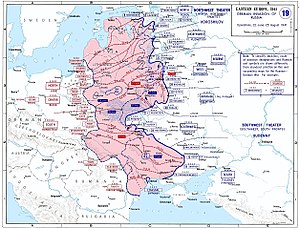Lithuanian 1941 independence
| June Uprising | |||||||
|---|---|---|---|---|---|---|---|
| Part of the Operation Barbarossa | |||||||
 German advances from June to August 1941 |
|||||||
|
|||||||
| Belligerents | |||||||
|
|
|||||||
| Strength | |||||||
| 12–15 divisions | 16,000–20,000 | ||||||
| Casualties and losses | |||||||
| 5,000 | 600 | ||||||
The June Uprising (Lithuanian: birželio sukilimas) was a brief period in the history of Lithuania between the first Soviet and Nazi occupations in late June 1941. Approximately one year earlier, on June 15, 1940, the Red Army invaded Lithuania and the unpopularLithuanian Soviet Socialist Republic was soon established. Political repression and terror were used to silence its critics and suppress any resistance. When Nazi Germany attacked the Soviet Union on June 22, 1941, a diverse segment of the Lithuanian population rose up against the Soviet regime, declared renewed independence, and formed the short-lived Provisional Government. Two of the major Lithuanian cities, Kaunas and Vilnius, fell into the hands of the rebels before the arrival of the Wehrmacht. Within a week, the German Army took control of the whole of Lithuania. The Lithuanians greeted the Germans as liberators from the repressive Soviet rule and hoped that the Germans would re-establish their independence or at least allow some degree of autonomy (similar to the Slovak Republic). No such support came from the Nazis, who steadily replaced Lithuanian institutions with their own administration. The Reichskommissariat Ostland was established at the end of July 1941. Deprived of any real power, the Provisional Government self-disbanded on August 5.
...
Wikipedia
